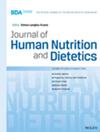Informal caregiver and healthcare professional perspectives on dementia and nutrition
Abstract
Background
Persons living with dementia and informal caregivers are at a higher risk for malnutrition. Most caregivers are not experts at identifying nutritional complications of dementia. Therefore, we aimed to identify nutrition knowledge and challenges related to feeding and caring for persons with dementia to develop a meaningful intervention.
Methods
A mixed-methods approach was used. Eight focus groups were conducted with caregivers of persons living with dementia (n = 28) and healthcare professionals (n = 23). Data was analysed using NVivo software. A questionnaire was administered to identify nutritional challenges. A modified food frequency questionnaire assessed food patterns of caregivers and persons with dementia. Results were compared to Mediterranean-DASH Intervention for Neurodegenerative Delay (MIND) dietary guidelines. Data were analysed using SPSS software.
Results
Four major themes emerged: forgetting to eat, developing food aversions, strong preferences for sweets and weight changes. Findings revealed common strategies used to improve nutrition intake included cueing, supplements and quiet eating environment. Caregivers were impacted by stress leading to poorer food choices and exhaustion. Recommendations for a caregiver program made by participants included education, resources and support. Findings from the food frequencies questionnaire survey showed most participants had a lower dietary diversity compared to the MIND diet guidelines.
Conclusions
With both groups being more prone to malnutrition, this research shows that participants were less likely to obtain adequate nutrition for brain health. Additionally, caregivers are dealing with nutrition issues themselves and their person living with dementia. The findings support the need for registered dietitians to provide tailored nutrition interventions for these families.

 求助内容:
求助内容: 应助结果提醒方式:
应助结果提醒方式:


